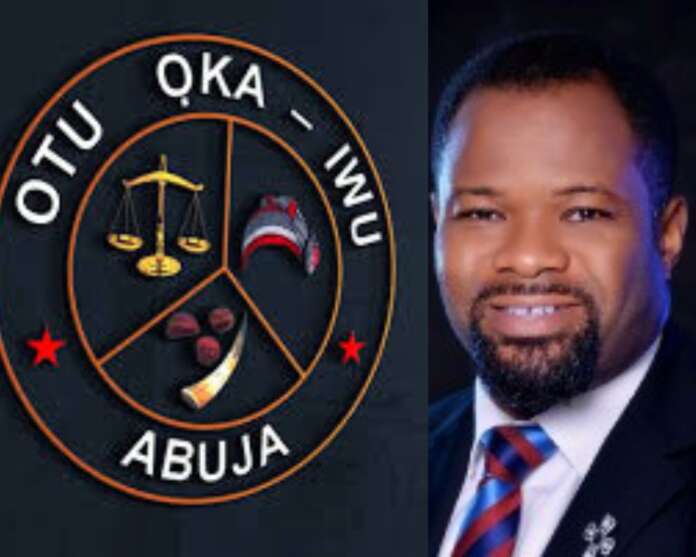Press statement
Otu Okaiwu Abuja strongly condemns the Senate’s refusal to immortalize Prof. Humphrey Nwosu, former Chairman of the defunct National Electoral Commission (NEC). This decision undermines the invaluable contributions of Prof. Nwosu to Nigeria’s democratic journey and raises deep concerns about the recognition of individuals who have shaped our nation’s political evolution.
Prof. Nwosu’s role in the historic June 12, 1993 presidential election remains one of the most pivotal moments in Nigeria’s democratic struggles. Under his leadership, Nigeria witnessed an electoral process hailed as the freest and fairest election in the country’s history, a testament to his vision, courage, and dedication to transparent democracy. Though the election was unjustly annulled, his integrity remained unquestionable, and his work continues to inspire electoral reforms today.
Even more compelling, former military President Ibrahim Babangida (IBB), in his book, openly vindicated Prof. Nwosu, acknowledging that he upheld fairness and professionalism despite the political turmoil surrounding the election. This affirmation from a key figure in Nigeria’s leadership further solidifies Prof. Nwosu’s legacy as a man whose name should be etched in the annals of history alongside democracy’s greatest champions.
To deny Prof. Nwosu the same national recognition accorded to Chief MKO Abiola is to ignore the full story of our democracy. MKO Abiola was the symbol of the mandate, but Prof. Nwosu was the executor of that democratic hope; the man who ensured that fairness prevailed and Nigeria had a taste of genuine democracy. His actions made June 12 possible, and his legacy must be honored accordingly.
Furthermore, denying the request to immortalize Prof. Nwosu is tantamount to denying the contributions of “Ndi Igbo” to the democratic struggles in Nigeria. Such a decision risks alienating a significant part of the nation’s history and undermines the unity and inclusivity that democracy seeks to uphold. The rejection of this motion is an affront to the contributions of “Ndi Igbo” in the fight for democratic governance in Nigeria. By refusing to immortalize Prof. Nwosu, the Senate sends an unfortunate message that the sacrifices and efforts of Igbo leaders in shaping our political landscape are unworthy of recognition. This is not just a dismissal of an individual; it is a dismissal of an entire people’s role in advancing Nigeria’s democratic system.
Just like “Ndi Igbo” have always added value to the growth of Nigeria, immortalizing Prof. Nwosu would serve as an invaluable lesson to Nigeria’s youth on the importance of integrity, courage, and resilience in leadership. His life’s work teaches us that democracy is not just about voting, it is about justice, transparency, and standing firm in the face of challenges. Young Nigerians should draw inspiration from his story, recognizing that true democracy requires strong institutions and fearless individuals. Prof. Nwosu demonstrated this by organizing an election that reflected the people’s will, despite political interference.
History must be preserved and acknowledged, ignoring those who fought for democracy distorts national history and denies future generations the chance to learn from past struggles. Indeed, fairness in governance benefits everyone, not just a select group. Thus, the rejection of Nwosu’s recognition sets a dangerous precedent where justice is not evenly applied, leading to division and disenchantment among Nigerians.
Unfortunately, some Senators’ opposed the motion to immortalize Prof. Nwosu, arguing that he failed to announce the results of the June 12 election, which were later annulled by the military government. They claimed that his inability to declare Chief MKO Abiola as the winner demonstrated a lack of courage and undermined his role as an electoral umpire. Others contended that recognizing Prof. Nwosu would distort history, as his actions did not directly lead to the democratic outcomes Nigerians hoped for. They argued that national honors should be reserved for individuals who displayed exceptional bravery and paid the ultimate price for democracy.
We submit that these claims are unattainable, the Senators’ argument fails to consider the extreme circumstances under which Prof. Nwosu operated. With the military regime exerting immense pressure and threats, his decision to halt the announcement of results was not a failure of courage but a strategic move to preserve lives and prevent chaos. Recognizing this context is crucial to understanding his contributions. Again, the former military President Babangida himself acknowledged Prof. Nwosu’s integrity and professionalism in his book, stating that Nwosu conducted the election transparently despite the challenges. This vindication directly counters claims that Nwosu’s actions were inadequate. Furthermore, Prof. Nwosu’s introduction of the Option A4 voting system revolutionized Nigeria’s electoral process, promoting transparency and credibility. His legacy is not solely tied to the announcement of results but to the systems and principles he established, which continue to shape Nigeria’s democracy.
Immortalizing Prof. Nwosu would serve as a unifying act, bridging ethnic divides and fostering national pride. Denying him recognition risks alienating Ndi Igbo and undermining the inclusivity that democracy seeks to uphold.
Otu Oka-iwu Abuja therefore calls on the Senate to reconsider its stance and immortalize Prof. Nwosu by naming a national monument, such as the INEC headquarters, after him. This act will affirm Nigeria’s commitment to recognizing ALL its heroes and ensuring that justice, fairness, and democracy remain the guiding principles of our nation.
Chidiebere Nwabueze Udekwe, ESQ
PRESIDENT Otu Okaiwu Abuja





